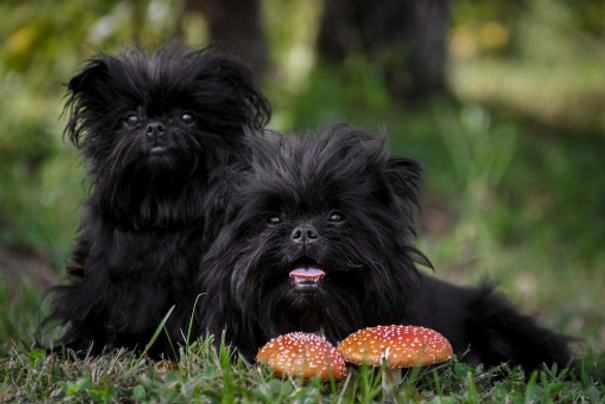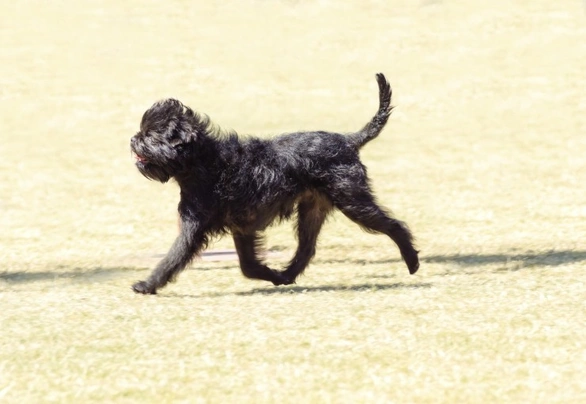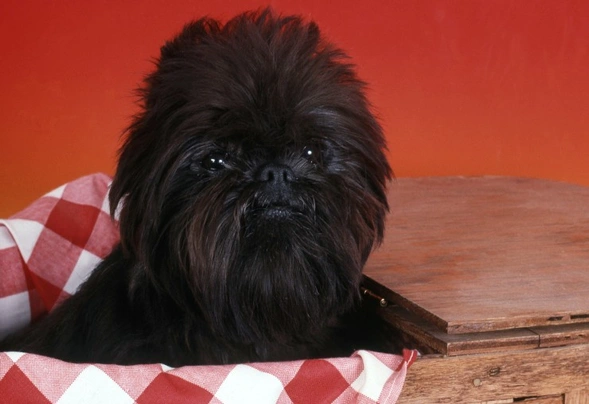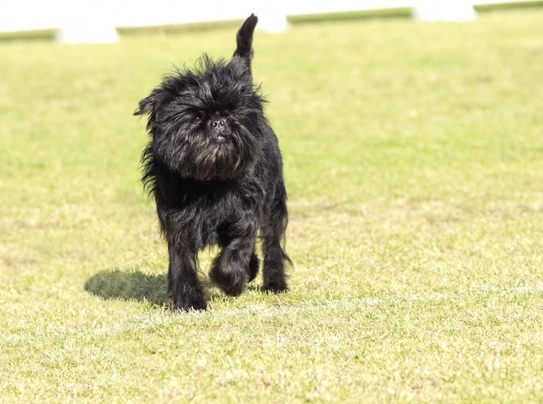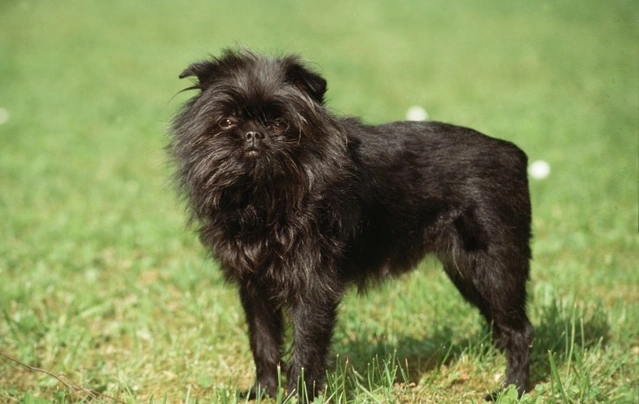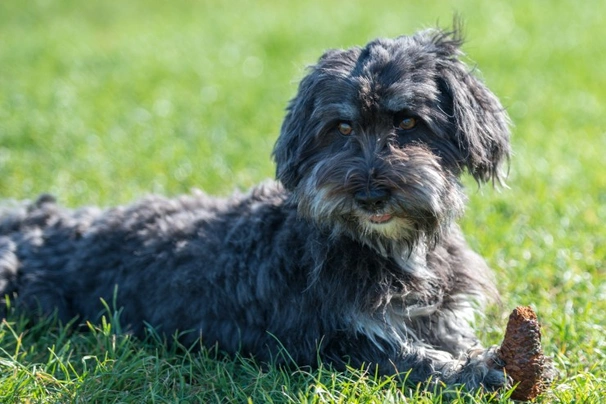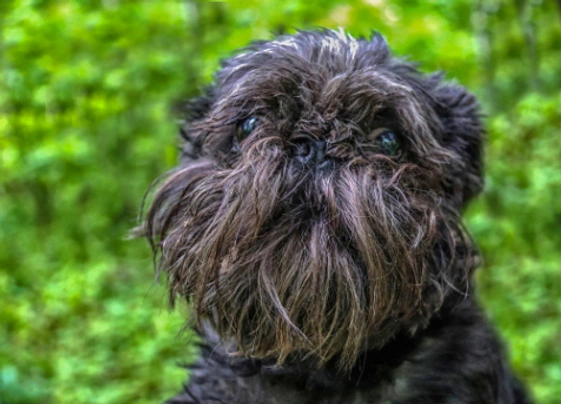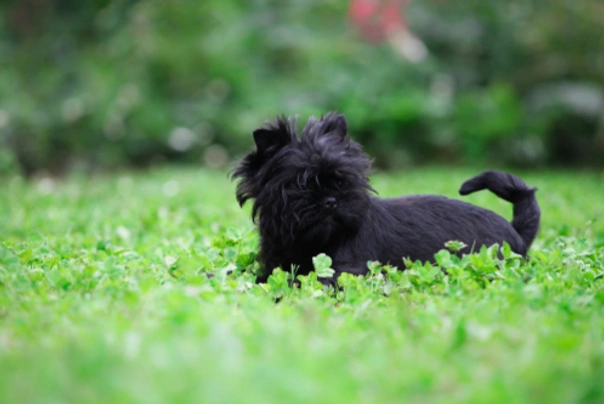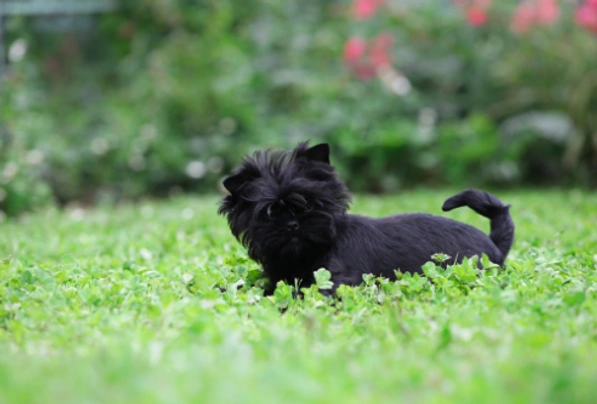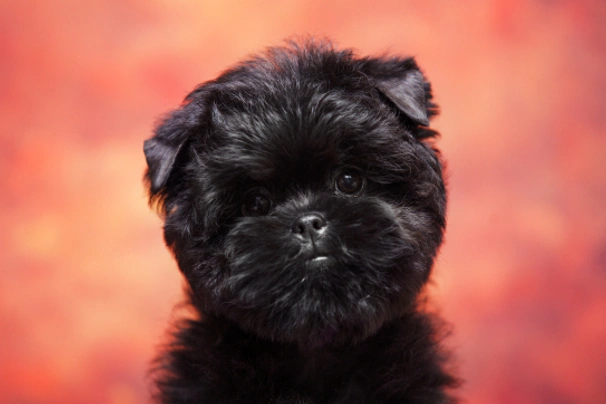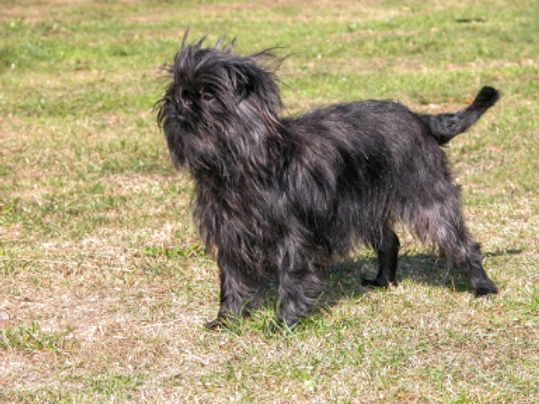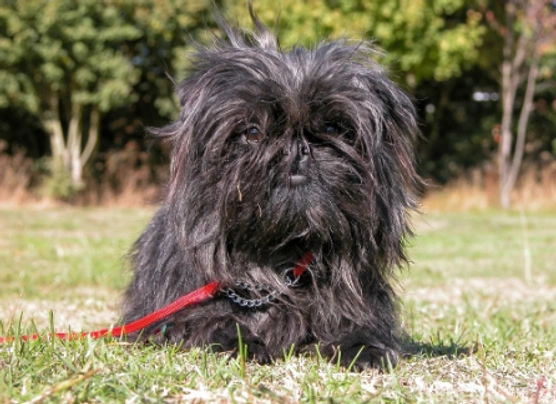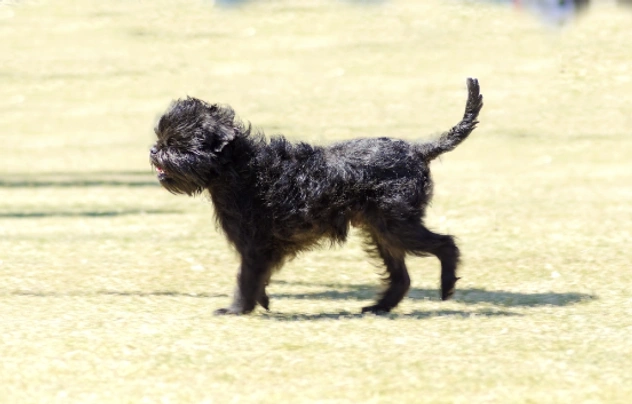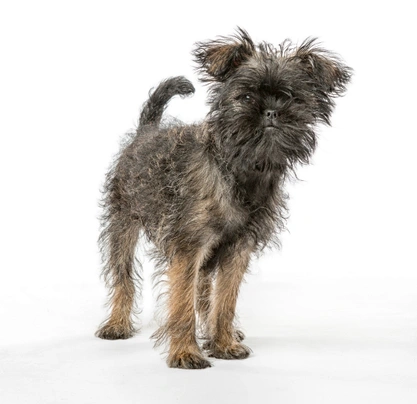Affenpinscher
Pros
Cons
Introduction of the Affenpinscher
There is no mistaking the unique looks of an Affenpinscher because these little dogs have quite monkey-like faces. They boast being among the oldest of the Toy breeds around and their ancestry can be traced as far back as the 17th century. They were first bred in Germany but today these little dogs have found their way to other parts of the world including here in the UK where they are typically kept as companion dogs. Apart from their adorable looks
Affens boast fun-loving albeit "naughty" natures and they like to be kept busy adapting well to living in towns or a country environment. However the Affenpinscher is the sort of character that likes to be a lapdog but they also like being out and about doing things whenever they can.
History of the Affenpinscher
Affenpinschers are depicted in paintings that date back to the 15th and 16th centuries which means they are one of the oldest toy breeds on the planet. They originate from Germany and translated their name means "mock terriers" or some people believe the rough translation should be "Monkey Mutt". These little dogs boast being the very first of the "monkey-faced" toy breeds to be developed and are responsible for the development of other breeds like the Griffon Bruxellois as well as the Griffon Belge. These extraordinary looking dogs were also used to create the Miniature Schnauzer. It is thought that at one time there were two sizes of Affens but the larger of them no longer exists today.
These little dogs were originally bred to chase down vermin and proved themselves to be extremely good "ratters" and as such the breed soon became popular in Southern Germany during the 19th century. There are records of a 'Monkey Pinscher' dog being exhibited at dog shows in their native Germany and pretty soon well-heeled ladies of the day all had an Affen as their companion but by the turn of the 19th Century and from then onwards these little monkey-faced dogs were being exhibited in many dog shows across Germany and as a result they became popular with many German film stars back in the day. One of the most famous ladies being Mrs. Evelyn Walsh McLean owner of the large Hope Diamond. They were also depicted on postcards.
At the time in Germany Affenpinschers were classed in the same group as Pinscher Schnauzers with the first stud book listing 14 Affens in 1902 and their numbers continued to rise. Sadly their numbers declined over the ensuing years and still remain quite low even today in their native Germany.
It is worth noting that the Affenpinscher played an important part in the development of another much-loved breed namely the Miniature Schnauzer but they were also used to create the Brussels Griffon too which was fortunate because after the World Wars Griffons were used to rescue the breed from vanishing altogether. Griffons also helped develop Affens with shorter muzzles and prominent chins that we see in the breed today.
By the 1950's the Affenpinscher became a popular choice outside of Germany mainly in the UK and the US where the breed gained a large fan base. Although Affens were bred to have all the usual "terrier" traits due to their small size they were mainly kept as companion dogs and are still as popular today with people the world over thanks to their unique monkey-like faces and disarmingly comical personalities.
With this said the breed's popularity was a little slower to take off than in the United States with the first Affen being registered with the Kennel Club in 1987. After this as further three dogs were imported to the country by a lady called Mrs. Wood who set about promoting the breed in the UK.
Over the ensuing years more Affens were imported into the country and the breed's popularity began to grow across the land. The Affenpinscher Club was later founded in 1982. Today these charming little monkey-faced dogs have earned the reputation of being loyal and comical companions to share a home with and their popularity is gaining momentum from year to year.
Interesting facts about the breed
- Is the Affenpinscher a vulnerable breed? No they have consistently been a popular choice both as a family pet and companion
- They have always been known for the cute "monkey-like" faces and their name Affenpinscher translated from German roughly means "Monkey Mutt"
- Affens only come in one colour which is black although dogs can have grey flecks in their coats too under the Kennel Club breed standard
- The famous painter "Renoir" was a big fan of the breed
- In 1886 a Monkey Pinscher was exhibited at the Kennel Club Dog Show that was held at the Royal Aquarium
Appearance of the Affenpinscher
Height at the withers: Males 23 – 30 cm Females 23 – 30 cm
Average weight: Males 2.9 – 6.0 kg Females 2.9 – 6.0 kg
The Affenpinscher is a sturdy little dog with a monkey-like face that boasts a rough and wiry coat. They may look small but there is nothing fragile about an Affenpinscher. They are extremely confident and always full of self-importance. Their heads are quite small in relation to the rest of their body and they boast having a domed forehead with a wide brow and distinct stop. Their muzzles are short and blunt without being so much so that it causes breathing issues. They have prominent chins and their nostrils are nicely open.
Their eyes are very dark in colour medium in size and round with dogs always having a sparkle in them. Ears are set high on their head and are small which dogs either hold upright or they can drop down too. The Affenpinscher has a slightly undershot jaw with a broader lower jaw but their teeth never show when a dog's mouth is shut.
Their necks are straight and short with no sign of any wrinkling. Front legs are straight and close. Their backs are level and short with dogs boasting well sprung ribs and bellies that are slightly tucked up which adds to the breed's compact and sturdy appearance.
Their hindquarters are strong with a dog's back legs being nicely set under their bodies but never so much that it is exaggerated. Feet are round compact and small with dogs having dark nails and pads. Their tails are set high which Affenpinschers carry well up with a slight curve in it.
When it comes to their coat the Affenpinscher has a rough short and dense coat that's harsh to the touch. The hair is slightly shaggier on certain parts of their body which includes their necks shoulders and heads. The hair stands away from a dog's face which adds to their monkey-like looks. The accepted breed colour for Kennel Club registration is black but dogs are allowed to have grey shading in their coats too.
- Black
Gait/movement
When an Affen moves they do so with a lively alert strutting action with dogs lifting their feet high off the ground when they do. They should however never show any sort of hackneyed action.
Faults
The Kennel Club frowns on any exaggerations or departures from the breed standard and would judge the faults on how much they affect a dog's overall health and wellbeing as well as their ability to perform.
Males should have both testicles fully descended into their scrotums and it is worth noting that a dog can be a little lighter or heavier as well as slightly taller or shorter than set out in the Kennel Club breed standard which is only given as a guideline.
Temperament of the Affenpinscher
Affenpinschers are known to be real clowns with a bit of a mischievous side to their natures that adds to their overall appeal. With this said for such small dogs they are extremely courageous which in short means there is a very large personality in a rather small body. With this said they are the perfect lapdog and one that boasts being extraordinarily smart. It is said that Affens love two things in life the first being given as much attention as possible and the second being their food.
They are intelligent confident little dogs that boast all the usual "terrier" traits with an added cachet of self-importance. They are also known to be fearless which means they can get themselves into some difficult and dangerous situations by taking on much larger dogs. They are also known to be very wary of people they do not already know which is why it's essential for Affens to be well socialised from a young age to curb any sort of fiery and often quite aggressive behaviour towards strangers.
The Affenpinscher is also known to be quite "yappy" another behaviour that needs to be nipped in the bud when they are still puppies or it could lead excessive barking which can be a real issue for people who live in apartments. They do not like being left on their own for extended periods of time preferring human company because these little dogs can suffer from separation anxiety especially if they are not given enough exercise or mental stimulation on a daily basis. Rather than curl up in a cosy spot an Affen will stand at the door or window waiting for an owner to return home.
Are they a good choice for first time owners?
Affenpinschers are a good choice for first time dog owners because they are so amenable and people-oriented loving nothing more than to please and to entertain their owners whether they are in a family environment or kept as companions.
What about prey drive?
Affenpinschers have a high prey drive and love nothing more than to give chase to anything that tries to run away. As such care should be taken as to where and when an Affen can run off the lead more especially when there is wildlife and livestock close by.
What about playfulness?
Affens are known to have a very playful and fun-loving side to their natures and thrive on being entertained and entertaining their owners. They are known to be a little mischievous when the mood takes them and being so clever an Affen quickly learns how to get their own way when they want something.
What about adaptability?
Affenpinschers are highly adaptable dogs and providing they are given enough daily physical exercise combined with as much mental stimulation to prevent boredom from setting in they are just as happy living in an apartment in town as they are living in a house in the country**.**
What about separation anxiety?
Affens form strong ties with their families and dogs are never very happy when they find themselves left on their own for longer periods of time. They are better suited to people who either work from home or in households where one person stays at home when everyone else is out so they are never alone for any length of time which could see a dog suffering from separation anxiety. This can lead to them being destructive around the home which is a dog's way of relieving any stress they are feeling and a way to keep themselves entertained which includes barking incessantly to get attention and to show how unhappy they are at the situation.
What about excessive barking?
Affens are known to like the sound of their own voices a little too much which is something that needs to be gently nipped in the bud when a dog is still young being careful not to frighten them which could end up making them timid and shy.
Do Affenpinschers like water?
Care should always be taken when an Affenpinscher goes swimming because of their flat faces and the fact that some dogs have difficulty breathing. With this said a lot of Affenpinschers enjoy taking a dip in the water but anyone who shares a home with a dog that does not should never force them to go in because it would end up scaring them. With this said care should also be taken when walking an Affen off the lead anywhere near more dangerous watercourses just in case a dog decides to leap in or they fall in and then need rescuing because they cannot get out of the water on their own.
Are Affenpinschers good watchdogs?
Affens may be small in stature but they are always on the alert and therefore quick to let an owner know when they are strangers about or when something they don't like is going on in their environment. However thanks to their small size they are not very good guard dogs and rarely would a well socialised Affen show any sort of aggressive behaviour when someone they don't know comes to the door preferring to keep their distance and bark.
Intelligence / Trainability of the Affenpinscher
Because the Affen is an intelligent little dog that likes nothing more than to please they are generally easy to train. However their training and education must start when they are very young to curb some of their more annoying "terrier" traits which includes excessive barking and aggressive behaviour towards people they do not already know.
A puppy’s socialisation must be start as soon as they are fully vaccinated and this should include introducing them to as many new situations people animals and other dogs as possible so they grow up to be more well-rounded and balanced adult dogs.
Affen puppies like all puppies are incredibly cute and it is all too easy to spoil them when they first arrive in their new homes. However once a puppy is settled in owners must start out as they mean to go on to prevent their pets from developing any unwanted behavioural issues which includes "small dog syndrome". Affens may be cute when they are puppies but they are also very smart and therefore quick to learn new things which includes the "good and the bad".
Puppies must be taught the limits and boundaries so they understand what their owners expect of them. It also helps establish a "pecking order" and who is the alpha dog in a household. The first commands an Affen puppy must be taught are as follows:
- Come
- Sit
- Stay
- Heel
- Quiet
- Leave it
- Down
- Bed
Children and other
Affenpinschers are a great choice for families where the children in a household are older. They are not best choice if there are any toddlers or very young kids in the home. The reason being that Affens can be a little fiery at times and if they feel threatened or playtime gets too rough they will retaliate by nipping a child. With this said any interaction between an Affen and children should be well supervised at all times to make sure things stay nice and calm.
Care must be taken when an Affenpinscher is around any small animals and pets and this includes cats because they are terriers and as such would see them as "fair game" with disastrous results.
Health of the Affenpinscher
The average life expectancy of an Affenpinscher is between 11 and 14 years when properly cared for and fed an appropriate good quality diet to suit their ages.
Like so many other breeds the Affen although generally a healthy little dog is known to suffer from a few hereditary health issues which are worth knowing about if you are planning share your home with one of these lively monkey-faced dogs. The conditions that seem to affect the breed the most include the following and some of which are associated with the shape of their faces:
- Patella Subluxation - breed club testing available
- Legg-Calves-Perthes disease - also known as Von Perthes Disease
- Dental issues - thanks to the shape of their faces and mouths
- Tracheal Collapse
- Pyometra
- Syringomyelia (SM)
- Allergies
- Addison's Disease
- Diabetes Mellitus
- Cushing Disease
- Umbilical hernia
- Breathing issues - because they are a brachycephalic breed
- Broken bones
What about vaccinations?
Affen puppies would have been given their initial vaccinations before being sold but it is up to their new owners to make sure they have their follow-up shots in a timely manner with the vaccination schedule for puppies being as follows:
- 10 -12 weeks old bearing in mind that a puppy would not have full protection straight away but would be fully protected 2 weeks after they have had their second vaccination
There has been a lot of discussion about the need for dogs to have boosters. As such it's best to talk to a vet before making a final decision on whether a dog should continue to have annual vaccinations which are known as boosters.
What about spaying and neutering?
A lot of vets these days recommend waiting until dogs are slightly older before spaying and neutering them which means they are more mature before undergoing the procedures. As such they advise neutering males and spaying females when they are between the ages of 6 to 9 months old and sometimes even when a dog is 12 months old.
Other vets recommend spaying and neutering dogs when they are 6 months old but never any earlier unless for medical reasons. With this said many breeds are different and it is always advisable to discuss things with a vet and then follow their advice on when a dog should be spayed or neutered.
What about obesity problems?
As with other breeds Affens can gain weight after they have been spayed or neutered and it's important to keep an eye on a dog's waistline just in case they do. If a dog starts to put on weight it's important to adjust their daily calorie intake and to up the amount of exercise they are given. Older dogs too are more prone to gaining weight and again it's essential they be fed and exercised accordingly because obesity can shorten a dog's life by several years. The reason being that it puts a lot of extra strain on a dog's internal organs including the heart which could prove fatal.
What about allergies?
Some Affens are prone to suffering from allergies and it's important for a dog to see a vet sooner rather than later if one flares up. Allergies can be notoriously hard to clear up and finding the triggers can be challenging. With this said a vet would be able to make a dog with an allergy more comfortable while they try to find out the triggers which could include the following:
- Certain dog foods that contain high levels of cereal and other grain-like fillers
- Airborne pollens
- Dust mites
- Environment
- Flea and tick bites
- Chemicals found in everyday household cleaning products
Participating in health schemes
All responsible Affenpinscher breeders would ensure that their stud dogs are tested for known hereditary and congenital health issues known to affect the breed by using the following schemes:
What about breed specific breeding restrictions?
Apart from the standard breeding restrictions for all recognised Kennel Club breeds there are no other breed specific breeding restrictions for the Affenpinscher.
What about Assured Breeder Requirements?
The Kennel Club strongly recommends that all breeders use the following scheme on their dogs:
Caring for the Affenpinscher
As with any other breed, Affenpinschers need regular grooming to ensure their coat and skin are kept in top condition. They also need daily exercise to stay fit and healthy. Additionally, dogs should be fed high-quality food that meets all their nutritional needs throughout their life.
Caring for an Affenpinscher Puppy
Affenpinscher puppies are lively and full of energy, which means it's essential to prepare homes and gardens for puppies ahead of their arrival. A responsible breeder will have well-socialized their puppies, which always leads to more outgoing, confident, and friendly dogs from the start. That said, every puppy will feel vulnerable when leaving its mother and littermates, and this must be taken into account. The longer a puppy can stay with its mother, the better, though it should never be for too long.
It's best to bring a puppy home when there will be people in the house for the first week or so, which is the time needed for the puppy to settle in. Preparing the house and garden for puppies means putting away any tools and other objects that a lively puppy might injure itself on. Electrical cords should be kept out of reach because puppies love to chew on things. Toxic plants should be removed from gardens and homes.
Puppies need to sleep a lot to grow and develop properly, which means setting up a quiet area that is not too out of the way, where they can retreat when they want to take a nap, and it is important not to disturb them while they are sleeping. It’s also a good idea to keep "playtime" calm inside the house and have a more active "playtime" outside in the garden, which means puppies quickly learn to be less lively indoors.
The documentation provided by the breeder for a puppy should include all details about the deworming date and the product used, as well as information related to the microchip. It is essential that puppies are dewormed again following a schedule, which is as follows:
- Puppies should be dewormed at 6 months of age
- They should be dewormed again at 8 months of age
- Puppies should be dewormed at 10 months of age
- They should be dewormed at 12 months of age
Things You'll Need for Your Puppy
There are a few items that new owners should already have at home before bringing a new puppy home. It is often a good idea to limit the space where a puppy can play, especially when you cannot keep an eye on what they are up to, keeping in mind that puppies are often very lively, which means investing in puppy gates or a pen large enough to allow the puppy to express itself while keeping it safe. The necessary items are as follows:
- Good quality puppy or child gates to place on doors
- A well-made pen large enough for a puppy to truly express itself, as puppies love to do
- Many well-made toys that should include some very good chew toys suitable for puppies, keeping in mind that a puppy will start teething between 3 and 8 months of age
- Good quality food and water bowls, ideally ceramic rather than plastic or metal
- A grooming glove
- A slicker brush or a soft-bristled brush
- Dog-specific toothpaste and a toothbrush
- Scissors with rounded tips
- Nail clippers
- Puppy shampoo and conditioner, which must be specifically formulated for use on dogs
- A well-made collar or harness
- A couple of sturdy leashes
- A well-made dog bed that is neither too small nor too large
- A well-made dog crate to use in the car and at home, large enough to allow the puppy to move around
- Baby blankets to put in the crate and the puppy’s beds for when it wants to take a nap or go to sleep at night
Keeping Noise Levels Low
All puppies are sensitive to noise, including Affenpinscher puppies. It’s important to keep noise levels low when a new puppy arrives in the home. TVs and music should not be played too loudly, as this could stress a small puppy.
Keeping Vet Appointments
As mentioned earlier, Affenpinscher puppies will have received their initial vaccinations from the breeders, but they need to have follow-up shots, which is the new owners' responsibility to arrange. The vaccination schedule for puppies is as follows:
- 10 -12 weeks of age, keeping in mind that a puppy will not have full protection immediately but will be fully protected 2 weeks after receiving the second vaccine
Regarding follow-up shots, it is best to discuss this with a vet since there is much debate on whether a dog truly needs them after a certain time. However, if a dog were to ever go into boarding, its vaccinations should be fully up-to-date.
And Older Affenpinschers When They Reach Senior Years?
Older Affenpinschers need a lot of special care because, in their golden years, they are more at risk of developing certain health concerns. Physically, a dog's muzzle may start to turn gray, but there will also be other noticeable changes, including:
- Coat becomes coarser
- Loss of muscle tone
- Affenpinschers may become overweight or underweight
- Reduced strength and stamina
- Older dogs have difficulty regulating their body temperature
- Often develop arthritis
- The immune system no longer functions as efficiently as before, meaning dogs are more susceptible to infections
Older dogs also change mentally, meaning their response time tends to be slower and they develop the following:
- Respond less to external stimuli due to compromised vision or hearing
- Tend to be a bit more finicky about food
- Have a lower pain threshold
- Become intolerant of changes
- Often an older dog may feel disoriented
Living with an Affenpinscher in its golden years means taking on some additional responsibilities, but these are easily manageable and should include a review of their diet, the amount of exercise they receive, the frequency of changing dog beds, and checking their dental health, keeping in mind that they are known to suffer from dental problems due to the shape of their heads and mouths.
Older Affenpinschers should be fed a high-quality diet that meets their needs at this stage of their life, always keeping an eye on the dog's weight. A rough guide for feeding older dogs is as follows, keeping in mind that they should be fed highly digestible food that contains no additives:
- Protein content should be between 14% and 21%
- Fat content should be less than 10%
- Fiber content should be less than 4%
- Calcium content should be between 0.5% and 0.8%
- Phosphorus content should be between 0.4% and 0.7%
- Sodium content should be between 0.2% and 0.4%
Older Affenpinschers do not need to do the same amount of daily exercise as a younger dog, but they still need the right amount of physical activity to maintain muscle tone and prevent excessive weight gain. All dogs should have access to fresh, clean water, and this is particularly true for older dogs, as they are at higher risk of developing kidney issues.
Grooming of the Affenpinscher
An Affens coat is naturally quite scruffy looking being made up of shaggy harsh hair which means they are quite low maintenance on the grooming front. With this said a weekly brush is all it takes to keep their coats shiny albeit tousled looking and their skin in good condition. It's also a good to have their coats handstripped two or three times a year which is best left up to a professional dog groomer.
Puppies need to be introduced to grooming tools from a young age so they get used to them and look forward to the one-to-one attention they are given when they are being pampered and brushed. They need to have their paws ears and other parts of their body touched on a regular basis so that when it comes to trimming their nails and checking a dog's ears it is not a stressful experience for them to have to cope with.
It's also important to check a dog's ears on a regular basis and to clean them when necessary. If too much wax builds up in a dog's ears it can lead to a painful infection which can be hard to clear up. In short prevention is often easier than cure when it comes to ear infections.
Exercise of the Affenpinscher
Affenpinschers like to be kept busy and love being out and about exploring their environment. With this said if the weather is bad these little dogs are quite happy being given a short walk. Ideally they need anything from 20 to 40 minutes exercise a day and this must include lots of mental stimulation throughout the day so that boredom does not set in which could lead to an Affen developing some destructive behaviours around the home. This includes excessive barking and tearing up the place.
Puppies should not be allowed to jump up or down from furniture nor should then be allowed to go up and down stairs until they are at least 6 months old because it puts too much pressure on their growing joints and they might just end up breaking a bone.
Feeding of the Affenpinscher
If you get an Affen puppy from a breeder they would give you a feeding schedule and it's important to stick to the same routine feeding the same puppy food to avoid any tummy upsets. You can change a puppy's diet but this needs to be done very gradually always making sure they don't develop any digestive upsets and if they do it's best to put them back on their original diet and to discuss things with the vet before attempting to change it again.
Some dogs are known to be fussy or finicky eaters but it's important not to spoil them because it could lead to more problems feeding them later. It's best to feed a mature Affen twice a day once in the morning and then again in the evening making sure it's good quality food that meets all their nutritional requirements. It's also important that dogs be given the right amount of exercise so they burn off any excess calories or they might gain too much weight which can lead to all sorts of health issues. Obesity can shorten a dog's life by several years so it's important to keep an eye on their waistline from the word go.
Feeding guide for an Affenpinscher puppy
Puppies need to be fed a highly nutritious good quality diet for them to develop and grow as they should. As a rough guide an Affen puppy can be fed the following amounts every day making sure their meals are evenly spread out throughout the day and it's best to feed them 3 or 4 times a day:
- 2 months old - 43g to 107g depending on puppy's build
- 3 months old - 49g to 123g depending on puppy's build
- 4 months old - 50g to 129g depending on puppy's build
- 5 months old - 50g to 130g depending on puppy's build
- 6 months old - 42g to 129g depending on puppy's build
- 7 months old - 35g to 117g depending on puppy's build
- 8 months old - 34g to 94g depending on puppy's build
- 9 months old - 34g to 105g depending on puppy's build
- 10 months old - 34g to 93g depending on puppy's build
Once a puppy is 11 months old they can be fed adult dog food.
Feeding guide for an adult Affenpinscher
Once fully mature an adult Affen should be fed a good quality diet to ensure their continued good health. As a rough guide an adult Affenpinscher should be fed the following amounts every day:
- Dogs weighing 2.9 kg can be fed 48g to 59g depending on activity
- Dogs weighing 4 kg can be fed 55g to 63g depending on activity
- Dogs weighing 5 kg can be fed 80g to 93g depending on activity
- Dogs weighing 6 kg can be fed 95g to 108g depending on activity
Affenpinscher price
If you are looking to buy an Affen you would need to pay anything from £450 to over £600 for a well-bred pedigree puppy. The cost of insuring a male 3-year-old Affenpinscher in northern England would be £24.67 a month for basic cover but for a lifetime policy this would set you back £43.82 a month (quote as of February 2018). When insurance companies calculate a pet's premium they factor in several things which includes where you live in the UK and a dog's age and whether they have been neutered or spayed.
When it comes to food costs you need to buy the best quality food whether wet or dry to feed your dog throughout their lives making sure it suits the different stages of their lives. This would set you back between £20 - £30 a month. On top of this you would need to factor in veterinary costs if you want to share your home with an Affen and this includes their initial vaccinations their annual boosters the cost of neutering or spaying your dog when the time is right and their yearly health checks all of which quickly adds up to over a £800 a year.
As a rough guide the average cost to keep and care for an Affenpinscher would be between £50 to £80 a month depending on the level of insurance cover you opt to buy for your dog but this does not include the initial cost of buying a healthy well-bred Kennel Club registered pedigree Affenpinscher puppy.
Buying advice
When visiting and buying any puppy or dog there are many important things to consider and questions to ask of the breeder/seller. You can read our generic puppy/dog advice here which includes making sure you see the puppy with its mother and to verify that the dog has been wormed and microchipped.
Affenpinschers as previously mentioned have consistently been a popular breed both in the UK and elsewhere in the world which means that well-bred puppies can often command a lot of money. As such with Affens there is specific advice questions and protocols to follow when buying a puppy which are as follows:
- Beware of online scams and how to avoid them. You may see online and other adverts by scammers showing images of beautiful Affenpinscherpuppies for sale at very low prices. However the sellers ask buyers for money up front before agreeing to deliver a puppy to a new home. Potential buyers should never buy a puppy unseen and should never pay a deposit or any other money online to a seller. You should always visit the pet at the sellers home to confirm they are genuine and make a note of their address.
- As previously touched upon Affenpinschers have been a popular breed in the UK for a long time. As such there are many amateur breeders/people who breed from a dam far too often so they can make a quick profit without caring for the welfare of the puppies their dam or the breed in general. Under Kennel Club rules a dam can only produce 4 litters and she must be between a certain age to do so. Anyone wishing to buy an Affenpinscher puppy should think very carefully about who they purchase their puppy from and should always ask to see the relevant paperwork pertaining to a puppy's lineage their vaccinations and their microchipping.
- Prospective owners should be very careful when considering buying an extra small puppy because all too often they suffer from very serious health issues and no responsible breeder would purposefully breed dogs that are too small or dogs with very flat faces.
